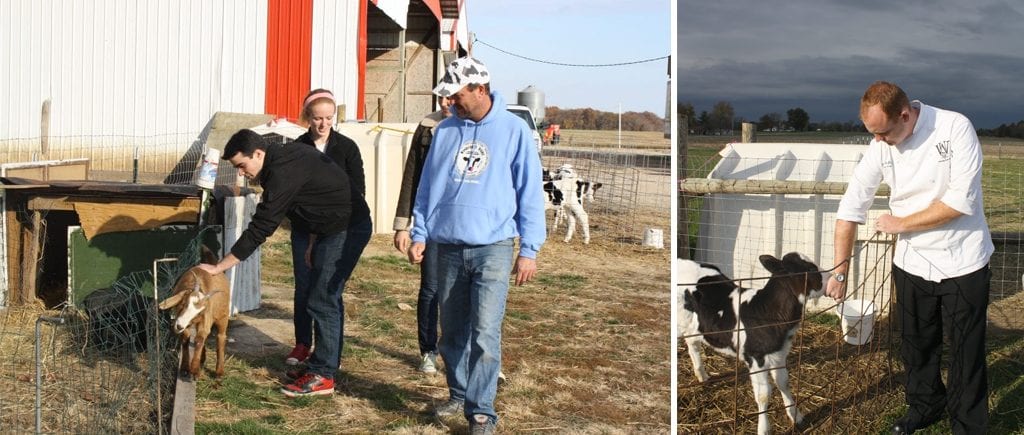Washington University in St. Louis will provide humanely-produced meat, dairy, and fish whenever economically and logistically feasible.
Specifically, WashU aims to purchase 15 percent environmentally preferable, humane, and fair food by 2017, and 25 percent by 2020 by dollars spent.
WashU Dining Services promotes vegetarian and vegan options. Dining Services’ partner Bon Appétit employs the food service industry’s most comprehensive farm animal welfare policy to date. All hamburgers at WashU are made with fresh ground grass-fed beef from cows raised on vegetarian feed without antibiotics or hormones. Turkey breast and chicken are produced without routine use of antibiotics as a feed additive. Milk from cows is never given artificial bovine growth hormones. WashU Dining Services only serves seafood purchased in accordance with the Monterey Bay Aquarium’s Seafood Watch guidelines for sustainability.
Dining Services has also committed to stringent sourcing guidelines. Since 2015:
- All precracked (liquid) eggs are produced from hens living in cage-free farms rather than hens confined in battery cages.
- The majority of pork is produced without gestation crate confinement systems, using higher-welfare group housing systems instead.
- Foie gras (livers of force-fed ducks) and veal from calves confined in crates have been eliminated from menus.

Above, students and Dining Services employees visit Windcrest Dairy, a local farm and one of WashU’s sources for dairy products.
The Certified Humane Label
Humanely-produced animal products are raised in an ethical fashion. The top standard for humane animal products is the Certified Humane label, which is given to meat raised without the confines of cages or stalls, with minimal stress, and also provided ample clean water and its natural feed (without added hormones or antibiotics). It certifies that the meat will be completely natural and contain the fullest set of nutrients, as well as being produced in a socially responsible manner. This process, in some cases, requires more land but also requires substantially fewer inputs in the forms of added hormones and antibiotics. Other certifications that touch on humane growing and production processes include Food Alliance Certification as well as the Monterey Bay Seafood Watch Guide for seafood.
Some other qualifications that are acknowledged as humane choices, although not as good as certification, including American Grassfed Association grassfed meat, pasture-raised meat, grass-finished meat and humanely-raised meats. These standards, however, are not as well monitored as the Certified Humane label and do not encompass as much of the production process.
Bon Appétit has been serving only Certified Humane cage-free shell eggs since 2005. It has also committed to antibiotic reduction by only purchasing poultry raised without non-therapeutic routine use of antibiotics, as well as providing options when available for antibiotic-free and vegetarian-raised beef. Since 2002, all milk and dairy products have not been treated with added rBGH. Aramark is currently investigating a transition to cage-free eggs, as well as dairy free of added bovine growth hormone. Seafood is already purchased in the categories of Best Choices or Good Alternatives according to Seafood Watch.
Certified Humane is a positive step toward sustainability. In practice, however, since Certified Humane meats tend to also be organic, organic meat will also be considered a humane product.
Dining Services Commitments
Dining partners on the Danforth Campus have committed to:
- Discontinue the purchase of beef treated with added Bovine Growth Hormone (rBST or rBGH).
- Determine sources of Certified Humane (or equivalent certification) meat available to dining.
- Label and specify Certified Humane (or equivalent certification) options in dining facilities.
- Seek to purchase only seafood from the Best Choices Category of the Seafood Watch Guide.
Additionally, on the School of Medicine Campus, Dining Services will:
- Encourage cage-free options as an intermediary step toward Certified Humane.
- Discontinue the purchase of milk and beef treated with added Bovine Growth Hormone (rBST or rBGH).
- Determine sources of Certified Humane (or equivalent certification) meat available to dining.